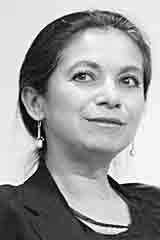Carmen Boullosa
| Carmen Boullosa | |
|---|---|

Carmen Boullosa (2006)
|
|
| Born | September 4, 1954 Mexico City, Mexico |
| Occupation | Poet, novelist playwright |
| Spouse(s) | Mike Wallace |
| Children | 2 |
Carmen Boullosa (born September 4, 1954 in Mexico City, Mexico) is a Mexican poet, novelist and playwright. Her work focuses on the issues of feminism and gender roles within a Latin American context. It has been praised by a number of writers, including Carlos Fuentes, Alma Guillermoprieto, Roberto Bolaño and Elena Poniatowska, as well as publications such as Publishers Weekly. She has won a number of awards for her works, and has taught at universities such as Georgetown University, Columbia University and New York University (NYU), the City College of New York and Blaise Pascal University in Clermont Ferrand, France. She has lectured at universities in a dozen countries.
Carmen Boullosa was born on September 4, 1954 in Mexico City, Mexico.
Boullosa has written seventeen novels. Though all different from one another, on theme and form, Boullosa´s style has s distinctive personality.
One of her novels, Son vacas, somos puercos (1991, translated into English in 1997 as They're Cows, We're Pigs) is narrated in the first person by an old man looking back on his life. He was kidnapped and sent from his native France on a slave ship to the West Indies at the age of thirteen. To gain his freedom, he joins a group of pirates (or "pigs"), allowing Boullosa to compare two very different societal and political systems—traditional Europe and carefree pirates. In La milagrosa, a novel written in 1993, the protagonist is a girl who has the power to heal the sick and perform other miracles while she sleeps. She falls in love with Aurelio Jimenez, a detective sent to discredit her, even though she fears that her powers will disappear if she spends time with people. It ends ambiguously, leaving an unsolved murder without closure. Duerme, another popular work published in 1995, tells the story of Claire, a French woman whose mother was a prostitute. Attempting to escape the same profession, she arrives in Spain dressed as a man. To save a subject of the Spanish king, she reveals herself as a female and prepares to take his punishment of death by hanging. Beforehand, however, she is wounded in the left breast and her blood is replaced by water from the lakes of Mexico City. The water's magical powers make it possible for her to survive the punishment.
...
Wikipedia
